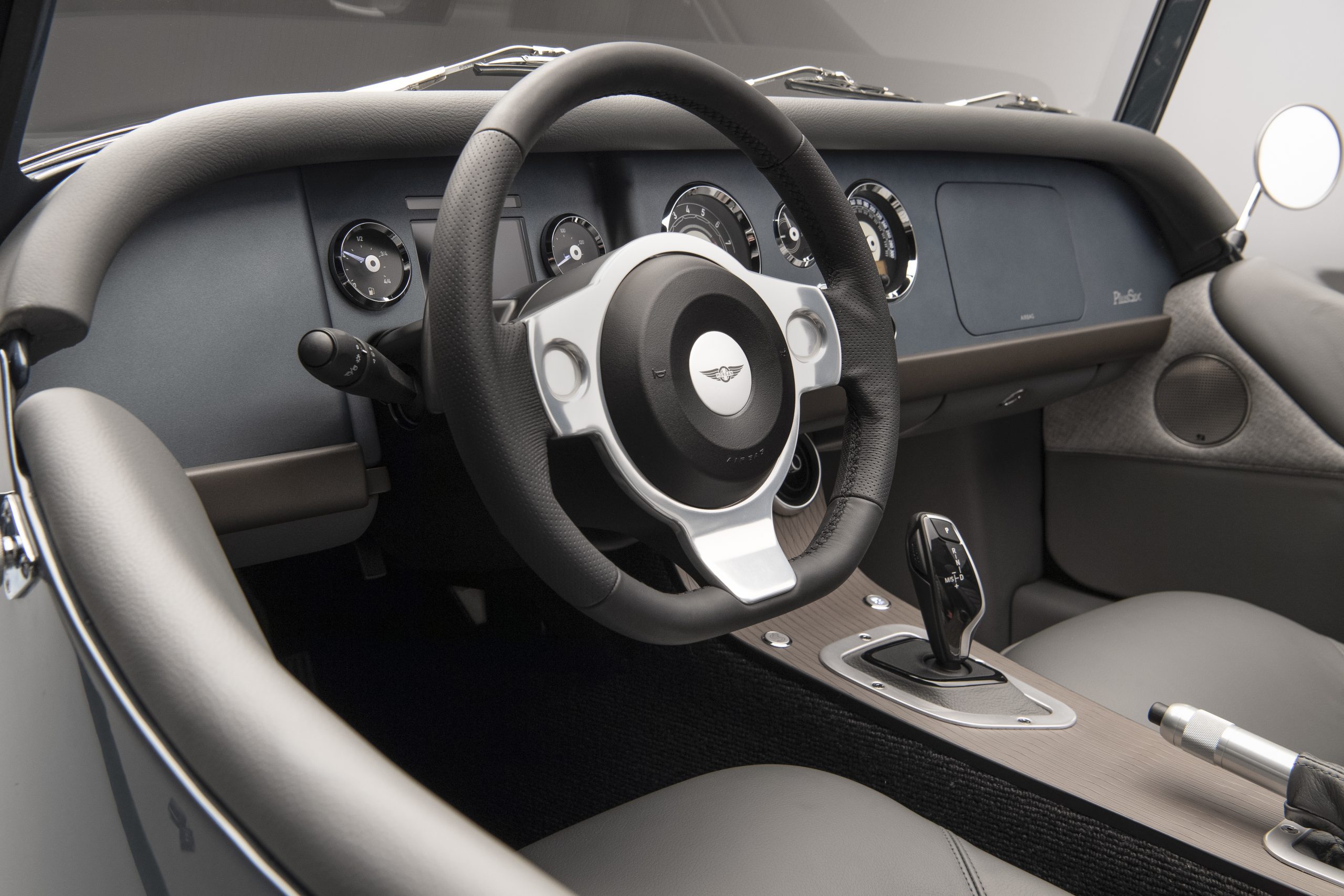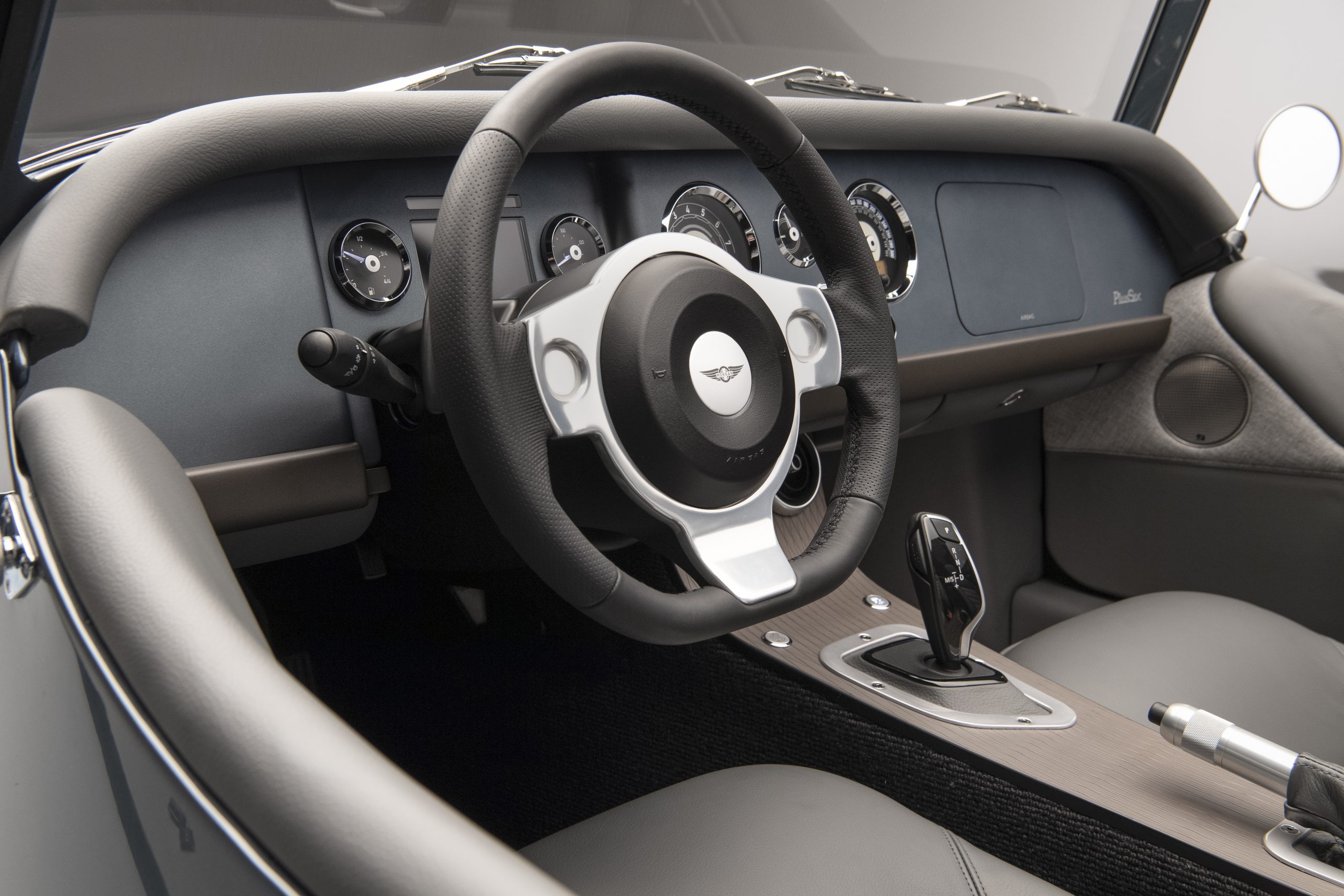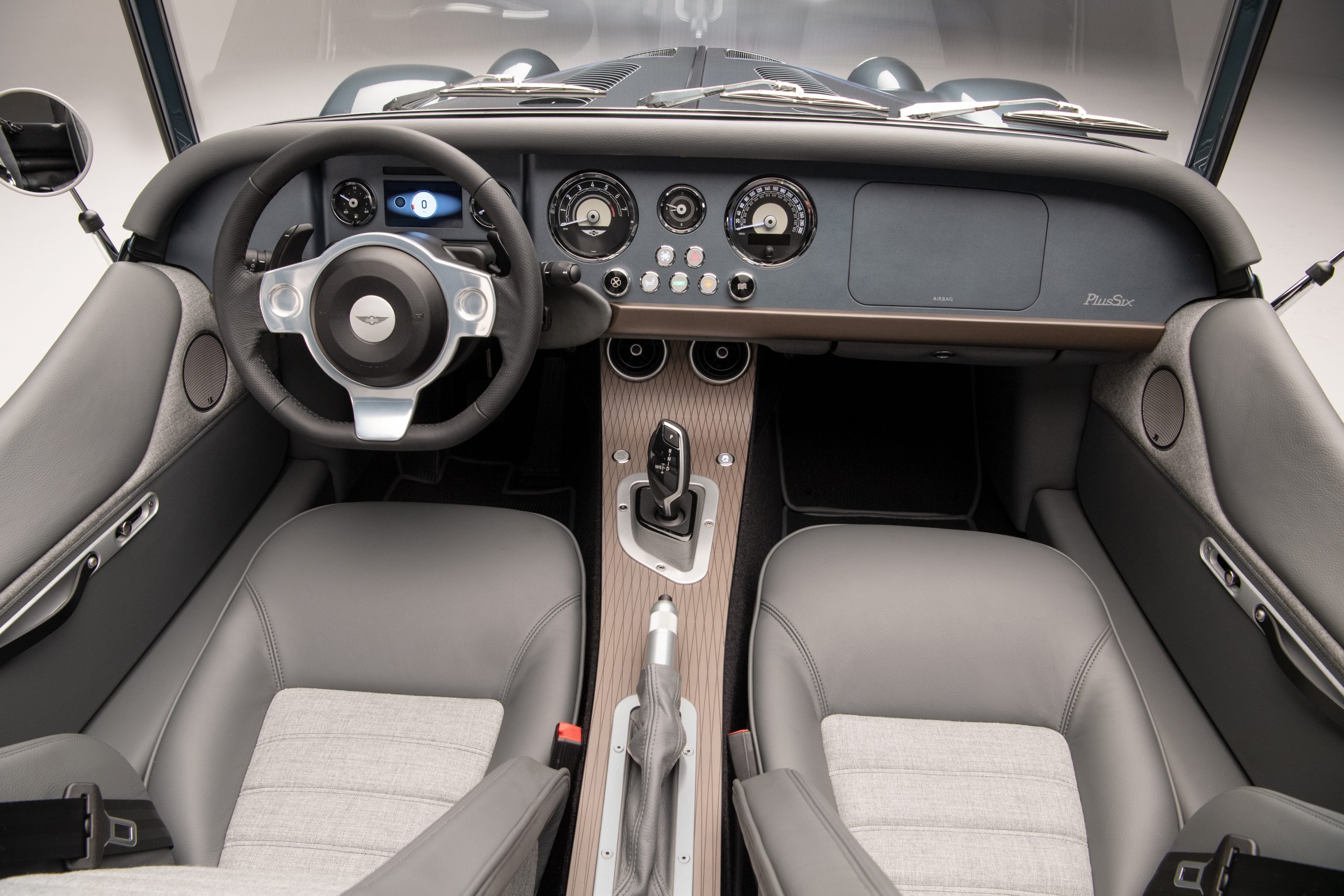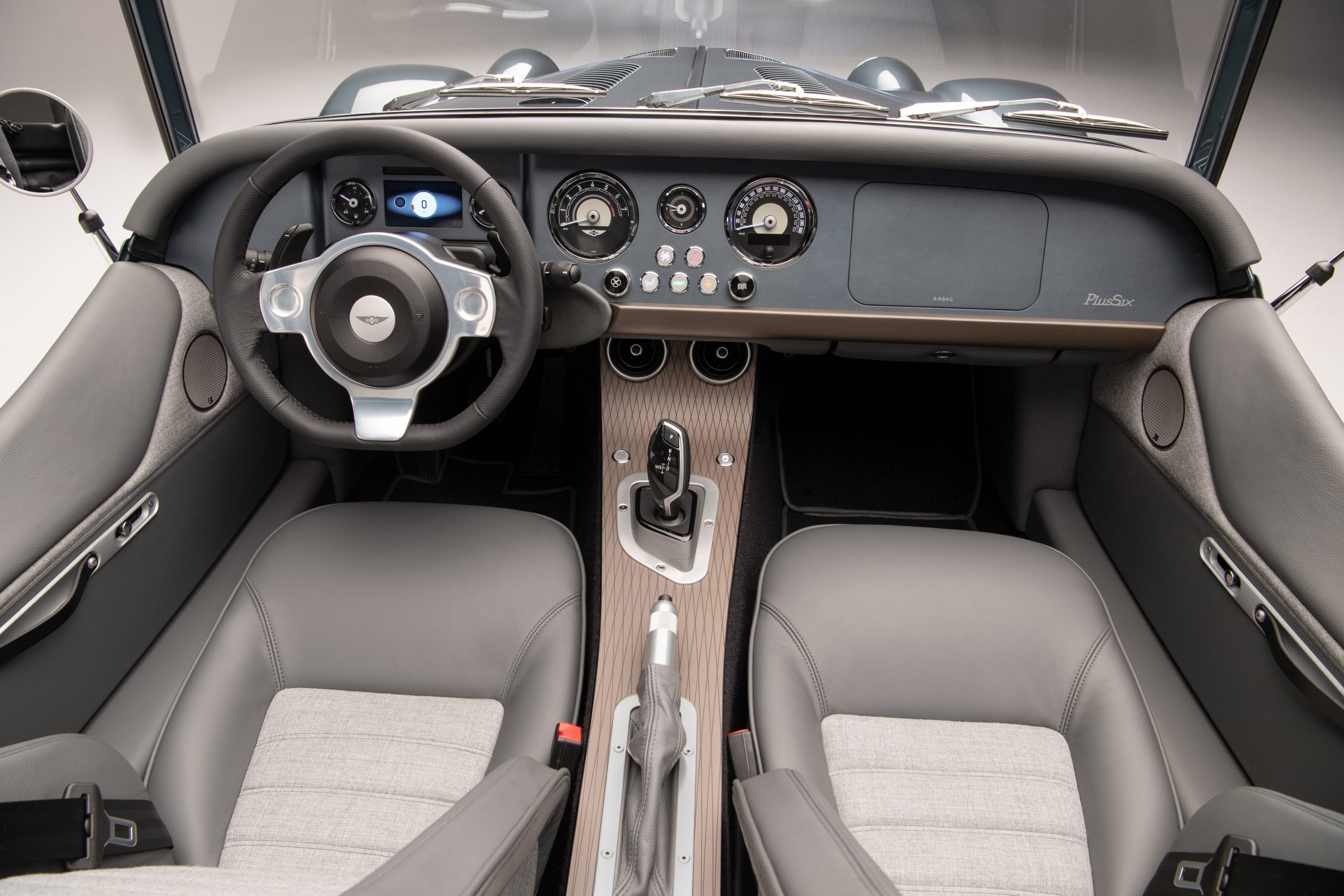Morgan Motor Firm is including to the Plus mannequin line-up with the reimagining of the Plus 4 and the Plus Six. As a part of the brand new ‘Plus’ line, enhancements might be launched and will probably be seen on the brand new Plus 4 and Plus Six fashions beginning January 2023.
The ‘Plus’ moniker signifies that it’s a mainstay of Morgan manufacturing and that it’s at par with the newly launched ‘Tremendous’. It was in 1950 that the ‘Plus’ was first launched within the Plus 4. With greater than 70 years of heritage, Plus bravely seems in the direction of the long run, totally embracing new applied sciences whereas reimagining the expertise of driving a contemporary but handcrafted sports activities automobile for the twenty first Century.
The brand new Morgan Plus 4 and Plus Six is coach-built utilizing Morgan’s CX-Technology bonded aluminum platform. Its design is an computerized timeless basic. The Plus 4 was given a barely narrower physique and wire wheels, with its aesthetic paying homage to the unique autos. However, the Plus Six have a wider and extra assertive look, and has a extra modern aesthetic. Each autos got new options and to make sure a extra cohesive tailoring expertise for shoppers, their listing of choices and configurations can even be intently aligned.
Morgan Motor Firm Chief Govt Officer Massimo Fumarola shared, “The brand new Morgan Plus line celebrates the essence of unconventional driving and moral engineering. It unites timeless design and craftsmanship with probably the most exhilarating driving engagement. With Plus we wish to honour these people who consider that motoring shouldn’t be about standing, however extra about character, authenticity, and pleasure.”


Inside Design
Important replace on the inside is likely one of the foremost options of the brand new Plus fashions from Morgan. It gives better refinement, extra personalization alternatives, and extra usability in comparison with the sooner generations.
A brand new vary of marquetry veneers which prolong all through the car ranging from its middle console has been launched, highlighting the corporate’s dedication to craftsmanship and bespoke tailoring, showcasing the pure supplies, type, and design that Morgan has change into recognized for.
Summary motifs for transferring spokes are ‘Spokes in Flight’ and ‘Kinetic Diamond’, that are impressed by the spoked wheels that for many years have been featured on Morgan vehicles. A 3rd veneer choice is ‘Engineered’ and it options aluminum strips between wooden, and it signifies the 2 core supplies that Morgan has used of their vehicles.
A brand new instrument panel and superformed aluminum dashboard will be laid out in both matte black, or matte silver. It can be specified to match a selected physique colour. On the passenger aspect of the dashboard, it can be specified {that a} mannequin designation be positioned. New devices are featured on the dashboard, and it’ll even have a brand new face art work. A minimal and clutter-free aesthetic is featured on the instrument art work which was impressed by premium timepieces and has been simplified. The dashboard design incorporates a brand new and bigger LCD data show display screen, and has been positioned in entrance of the driving force. To enhance its usability for drivers, it was given up to date display screen graphics and improved animation. The display screen itself is delicate, solely displaying crucial data, as a part of Morgan’s philosophy of appropriately introducing expertise to its autos.
Beneath the aluminum dashboard is a strong picket decrease rail that coordinates with the middle column. Every picket part was meticulously handcrafted by the expert craftspeople at Morgan, and it may be given quite a lot of finishes and colours. For the primary time, a Plus mannequin was given a brand new glovebox, and it sits just under the picket decrease rail, is designed in matching leather-based, and it’s also the place the USB energy sockets had been hidden.
The steering wheel can now be specified to have a satin polished middle part which coordinates with different inner embellishers which incorporates the door deal with, speaker grille, hand brake, and equipment shift surrounds.


Designed particularly for the newest Plus fashions is the two-tone material which gives a mixture of textures and superbly contrasts on the seats and door playing cards. As customary, it has black pebble grain leather-based and black material, and it has an extra six colour choices and leather-based grains to select from.
The pure textile is woven from worsted wool utilizing effective marl yarns. Every material is matched with a complimentary leather-based colorway, in order that the leather-based is used sparingly, celebrating it as a effective materials.
Some of the noticeable replace to the door inside is the brand new ‘bolt-action’ door deal with which is positioned on the decrease part of the door. Created from lacquered stainless-steel and high-quality saddle leather-based, it provides an aesthetic improve in addition to a powerful mechanical sensation throughout egress.
A wide range of enhancements can be seen in each the usual and Consolation Plus seat choices. A full redesign was given on the headrests of each seat variants and it now options intricate sew element and is now slimmer than earlier than. Consolation Plus seats now have an adjustable thigh bolster and knurled steel recline adjustment degree. For the primary time in Plus fashions, Morgan additionally added an optionally available built-in cup holder. It may be indifferent and simply matches into the bottom of the passenger seat.
Morgan Motor Firm Chief Design Officer Jonathan Wells said, “The Plus line in 2023 presents a marked evolution of the four-wheeled Morgan. As with all enduring design, it’s essential to strike a stability between transferring ahead while complementing established product qualities.
“The design group is lucky to work in proximity with mechanical and high quality engineers, in addition to the craftsmen at Pickersleigh highway. Designers can ship options that envelope a transparent understanding of constraints and alternatives. By way of this understanding, we’ve got been capable of introduce sizeable new applied sciences and options, while additionally enhancing the perceived high quality of Morgan Plus vehicles.
“A holistic complete car research has thought-about the extra important modifications, by to a number of extra nuanced design updates – the elevated impression of high quality might be evident.”


Participating Car Dynamics
A Morgan sports activities automobile is outlined by its light-weight engineering, the driving pleasure it offers, and the distinctive connection it gives between the driving force and the automobile. To make sure the continual dynamic evolution of Plus fashions, in-house engineering groups in Morgan have consistently labored with trade main exterior companions. Throughout the entire course of, It was vital that the important thing rules of the Morgan driving expertise is stored, this additionally consists of necessities for future expertise, security, and legislative necessities.
The brand new Plus fashions additionally launched Digital Stability Management (ESC) and an all-new braking system, which had been developed with Continental and AP Racing. All Plus 4 and Plus Six fashions can have ESC. The ESC is mode dependent and it has been tuned for every mannequin and gearbox variant, and relying on the driving mode, it can be switched between ranges of help.
Developed with the ESC program, the brand new AP Racing braking system was designed to ship high-performance braking.
In partnership with BMW, they developed bespoke gearbox calibrations for the automated variant of the Plus 4 and Plus Six fashions.
In ‘regular’ driving mode, 4 calibrations will robotically adapt gear shifting primarily based on the steering angle and brake strain. 4 extra calibrations are added in ‘Sport’ and ‘Sport+’ modes, programmed to be extra dynamic, it would adapt gear shifting which can be primarily based on the steering angle and brake strain.
An accelerometer and driver torque demand is used the brand new hill detection in order that it may possibly robotically choose a decrease gear for steep inclines. Other than enhancing drivability and rising efficiency, the brand new calibrations additionally improves effectivity.
Finishing the dynamic enhancements of the Plus fashions is the addition of the brand new suspension dampers and bushes. Additional refinement is supplied by the brand new bush score on low-frequency highway undulations whereas the brand new dampers improve journey compliance, high-speed efficiency, and progressive price.
As customary, airbags have been added behind the brand new aluminum dashboard and within the steering wheel. These new addition represents a major engineering challenge and is above the homologation necessities for the car.
“The introduction of recent dynamic options to our newest Plus fashions displays Morgan’s philosophy of continuous evolution. Above all, Morgan sports activities vehicles must be enjoyable to drive, offering occupants with a singular and memorable expertise. Our newest introductions have a good time these qualities, while additionally rising the extent of security, and future-proofing our fashions in opposition to ever altering legislative necessities,” stated Morgan Motor Firm Chief Technical Officer Matt Gap.


Sennheiser Audio
As a part of Morgan’s philosophy of bringing collectively conventional coachbuilding strategies with the newest expertise, Morgan is partnering with Sennheiser to offer a revolutionary audio system of their new Plus fashions. With greater than 75 years of expertise in audio and music, Sennheiser’s experience is unmatched.
Earlier Morgan sports activities vehicles might have supplied an audio system, however Sennheiser’s audio expertise resolution matches its premium status, simply higher than any earlier programs. They supply an enveloping sound with a singular soundstage with the best degree of audio constancy.
Sennheiser’s tuning creates the phantasm of a sound stage in entrance of the passengers, including an unmatched high-quality soundtrack throughout memorable drives. The AMBEO Contrabass algorithm permits the audio system to create a singular bass response which has been optimized for definition, punch, and depth and nonetheless retains the system environment friendly and compact.
Eight transducers are used within the system; 4 typical audio system are positioned within the door and rear panel, and an extra 4 invisible audio system had been added, with three positioned behind the dashboard and one within the decrease compartment panel for bass copy. A brand new amplifier controls the transducers and it has a devoted DSP which is powered by Sennheiser’s audio processing software program.
The addition of the audio system doesn’t alter the design of the cabin, and using invisible audio system ensures that solely minimal weight is added, which is integral in each sports activities automobile. Premium sound high quality if maintained, even with the demanding circumstances that’s set by an open-top sports activities car.
Refined Sennheiser branding will be seen on the speaker grille positioned on every door. The long-lasting Morgan louvres stamped on every bonnet of Plus fashions influenced the design of the speaker grilles. Completed in polished satin, it’s coordinated with the opposite embellishers that may be seen within the cockpit of the car.
Head of Sennheiser Mobility Veronique Larcher shared, “Each corporations collaborated intently to create a one-of-a-kind product with no compromise in sound copy, efficiency, design, and high quality. We couldn’t have celebrated our highway debut higher than with a model whose pursuit of high quality and excellence in craftsmanship is so totally aligned with Sennheiser’s values.”


Individuality Celebrated
Individuality is actually celebrated by Morgan vehicles they usually actually encourage their homeowners to fee their very own bespoke Plus mannequin, as there’s all kinds of choices to pick from. Every buyer have the possibility to lastly deliver their dream automobile to life as they create a real one-off that displays their private fashion and style.
To assist shoppers by the method of commissioning their very own Morgan, the design group created a collection of specification themes that assist deliver the mannequin to life. These specs not solely showcase the flexibility of the Morgan design, however it additionally duplicates the totally different environs that Morgan vehicles frequent.
A few of these themes embrace Riviera, Nordic, Stateside, Britannia, City, and Alpine. Every one in all them will be chosen by Morgan’s on-line configurator beginning 2023.
In honor of the corporate’s roots in motorsport and trialling success, additionally they added 12 new graphic packs that embrace roundels, strikethrough numbers, and bonnet stripes. They can even be out there beginning 2023. For added personalization, all of the graphics might be out there in black, white, or clear vinyl. Another choice is the ‘pilot’ and ‘co-pilot’ name signal that may be positioned on the outside of the car.
Manufacturing is scheduled to start out in January 2023 and potential shoppers are at the moment welcome to already begin their bespoke Plus commissions.


























